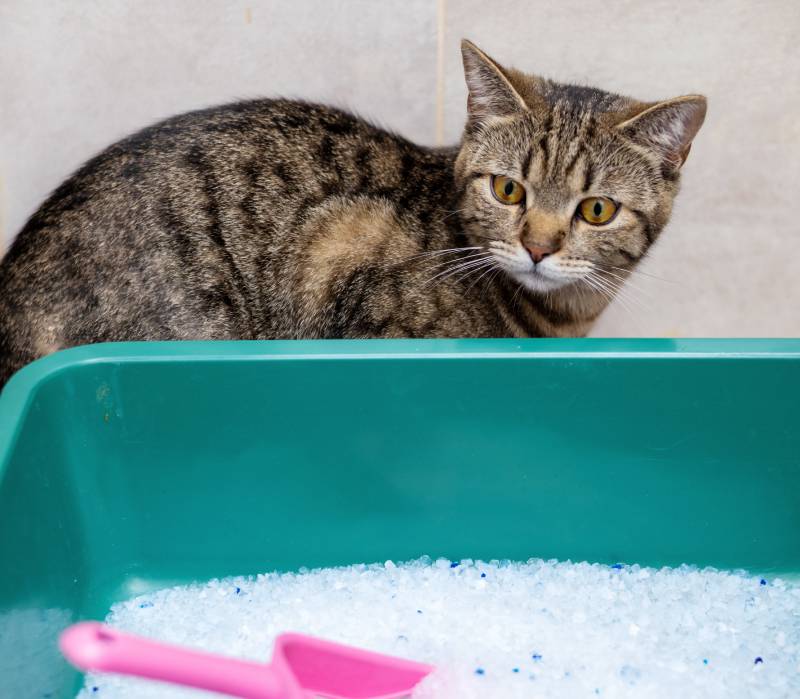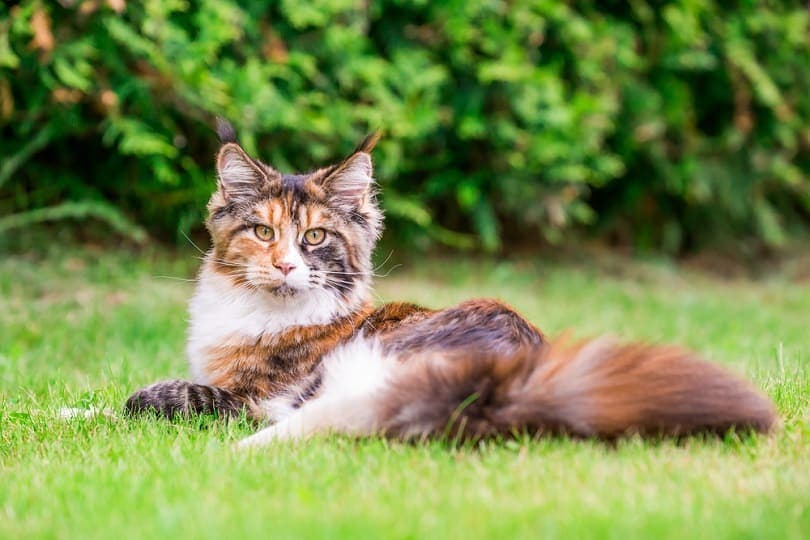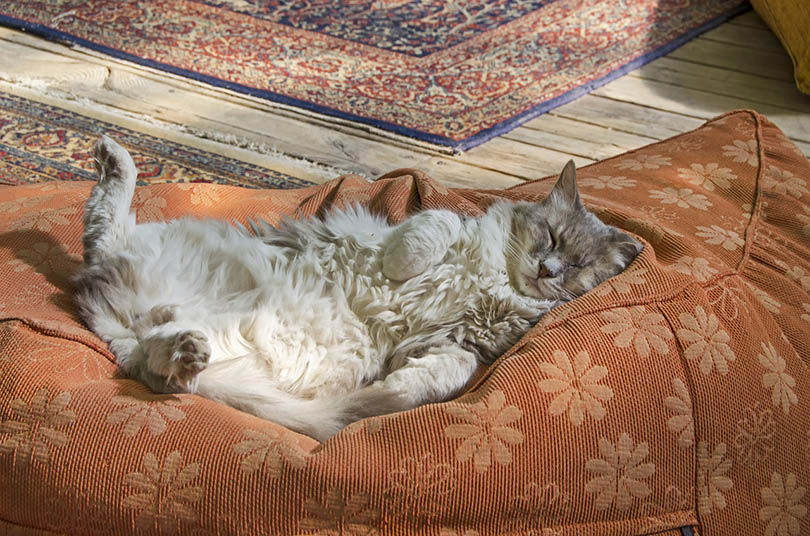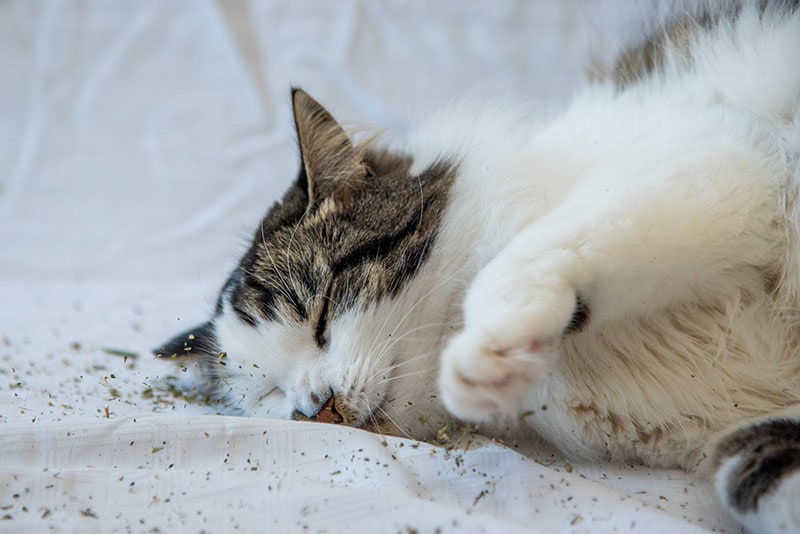VET APPROVED

The information is current and up-to-date in accordance with the latest veterinarian research.
Learn more »Cats have some of the strongest olfactory (smell) senses in the animal kingdom. Although cats have fewer scent receptors when compared to dogs, which are known for their scenting skills, cats may be able to discern between the scents better.1
Because cats have a more sensitive and developed sense of smell, they experience smells more intensely than humans—and they don’t always like them.
Let’s take a look at seven smells that most cats hate, so you can eliminate the smells from your home or use the smells as a repellent for areas you want cat-free, such as your furniture or garden.

Top 7 Smells Cats Hate
1. Citrus Scents

Most cats are bothered by citrus smells, such as lemon, lime, orange, and grapefruit. You can benefit from this by using orange or lemon peels in your garden to keep cats out or spritzing citrus scents on indoor fabrics.
Your cats are unlikely to ingest citrus fruit, given their distaste for it. but do your best to keep the peels out of reach.
2. Lavender and Eucalyptus

Lavender can be used to deter a lot of animals, including deer and insects. In some cases, lavender in your garden will keep your cat from messing with your plants, especially if it’s mixed with other pungent smells like eucalyptus.
These plants are considered toxic to cats and most often cause gastrointestinal issues, nausea, and weakness. To keep your cat safe, fence them off and avoid bringing them indoors. It’s also important to avoid using these essential oils in areas where your cat can ingest them, as they are highly toxic to cats.
3. Rosemary and Thyme

Common cooking herbs, rosemary and thyme have strong smells that many cats don’t seem to like. These can be added to your garden or put in pots in areas where you want to deter cats.
Rosemary and thyme are mostly harmless to cats, but avoid using essential oils with these scents, and in general. They’re concentrated and can cause digestive upset and more severe signs if ingested.
4. Pepper and Curry

Strong spices like pepper and curry are not fun for cats, which is why many people use cayenne or pepper flakes as a deterrent for cats. This is not ideal, however, or in accordance with animal welfare. Peppers have capsaicin, which can produce potentially toxic VOCs. So, while it may keep your cat away from an off-limits area, a curious or undeterred cat could become quite sick. Better to opt for a safer alternative.
5. Vinegar

Most cats hate the scent of vinegar, and it can be used as a safe deterrent just about anywhere. Vinegar smells strong to humans, but usually the scent tones down as it dries. Cats can still smell it, though, which makes it an effective deterrent for some.
Keep in mind that some cats will urinate on vinegar, so pay attention to how your cat reacts. Avoid cleaning any accidents with vinegar, since it can encourage repeated urination to dominate the scent.
6. Coffee

Cats rarely mess with our coffee, and that has everything to do with the strong smell. Caffeine is toxic to cats, so it’s a good thing that they avoid coffee.
You can use coffee grounds to keep cats out of your garden, but be sure to put them in a container to avoid any cats accidentally ingesting them.
7. Dirty Litter

Cats use urine to mark their territory. This is to keep other cats from venturing into their space. Cats don’t enjoy the smell of their own urine or anyone else’s, however, so it’s important to keep the litter box clean and tidy. If you don’t, you may encourage your cat to turn other parts of your house into a suitable litter box, like your bed or couch.
If you have a multiple-cat household, make sure you have enough litter boxes for everyone to claim their own space. Cats can boss each other around and intimidate other cats away from the litter box, so be sure that the litter boxes are all comfortable and available for your cats to use in a private area. If you notice a territorial dispute or inappropriate elimination outside of the litter box, increase the number of litter boxes and reconsider their position. Speak to your vet if the problem persists.

Conclusion
Cats’ powerful sense of smell can make even the most pleasant scents (for us) a nuisance for them, which you can use to your advantage. If you want to keep your cat out of your garden or away from furniture, you can use scents you know your cat is likely to hate as a deterrent. It’s important to be careful and considerate, and never use any toxic plants or essential oils and irritating scents.
- https://vcahospitals.com/know-your-pet/caffeine-toxicity-in-pets#:~:text=Large%20ingestions%20of%20caffeine%20can,if%20no%20treatment%20is%20given.&text=Dogs%20and%20cats%20are%20more%20sensitive%20to%20caffeine%20than%20humans%20are.
- https://www.ncbi.nlm.nih.gov/pmc/articles/PMC6770197/
- https://www.petmd.com/cat/general-health/what-smells-do-cats-hate
- https://www.petpoisonhelpline.com/blog/essential-oils-cats/
Featured Image Credit: Aleksei Verhovski, Shutterstock











